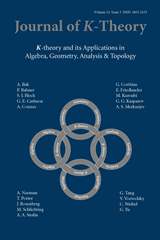Article contents
On Compact and Fredholm Operators over C*-algebras and a New Topology in the Space of Compact Operators
Published online by Cambridge University Press: 17 April 2008
Abstract
It is well-known that bounded operators in Hilbert C*-modules over C*-algebras may not be adjointable and the same is true for compact operators. So, there are two analogs for classical compact operators in Hilbert C*-modules: adjointable compact operators and all compact operators, i.e. those not necessarily having an adjoint.
Classical Fredholm operators are those that are invertible modulo compact operators. When the notion of a Fredholm operator in a Hilbert C*-module was developed in [6], the first analog was used: Fredholm operators were defined as operators that are invertible modulo adjointable compact operators.
In this paper we use the second analog and develop a more general version of Fredholm operators over C*-algebras. Such operators are defined as bounded operators that are invertible modulo the ideal of all compact operators. The main property of this new class is that a Fredholm operator still has a decomposition into a direct sum of an isomorphism and a finitely generated operator.
The special case of Fredholm operators (in the sense of [6]) over the commutative C*-algebra C(K) of continuous functions on a compact topological space K was also considered in [2]. In order to describe general Fredholm operators (invertible modulo all compact operators over C(K)) we construct a new IM-topology on the space of compact operators on a Hilbert space such that continuous families of compact operators generate the ideal of all compact operators over C(K).
Information
- Type
- Research Article
- Information
- Journal of K-Theory , Volume 2 , Special Issue 2: In Memory of Yurii Petrovich Solovyev October 8, 1944 – September 11, 2003 , October 2008 , pp. 329 - 351
- Copyright
- Copyright © ISOPP 2008
References
- 4
- Cited by

